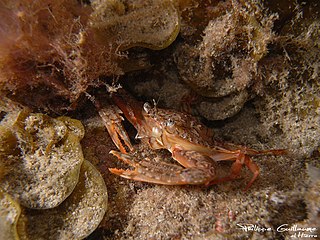
Portunus is a genus of crabs which includes several important species for fisheries, such as the blue swimming crab and the Gazami crab. Other species, such as the three-spotted crab are caught as bycatch.

Scylla paramamosain is a mud crab commonly consumed in Southeast Asia.

Clibanarius is a genus of hermit crabs in the family Diogenidae. Like other hermit crabs, their abdomen is soft-shelled and sheltered in a gastropod shell. Typically marine like all their relatives, the genus includes C. fonticola, the only known hermit crab species that spends all its life in freshwater. The feeding rates of Clibanarius species change with temperature which, given their broad distributions, may have considerable consequences for the stability reef systems as sea temperatures rise in the future.

Ovalipes is a genus of crabs in the family Ovalipidae.
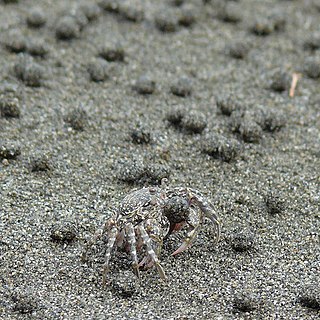
Sand bubbler crabs are crabs of the genera Scopimera and Dotilla in the family Dotillidae. They are small crabs that live on sandy beaches in the tropical Indo-Pacific. They feed by filtering sand through their mouthparts, leaving behind balls of sand that are broken up by the incoming high tide.

Macrophthalmus is a genus of crabs which are widespread across the Indo-Pacific. It contains the following species : Species in this genus are often referred to as sentinel crabs.

Charybdis is a genus of swimming crabs in the family Portunidae. It is named after the monster Charybdis of Greek mythology.
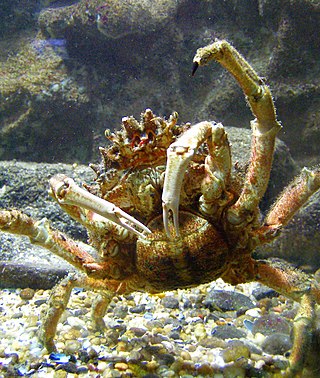
Maja is a genus of majid crabs erected by Jean-Baptiste Lamarck in 1801. It includes the following extant species:

Hemigrapsus sanguineus, the Japanese shore crab or Asian shore crab, is a species of crab from East Asia. It has been introduced to several other regions, and is now an invasive species in North America and Europe. It was introduced to these regions by ships from Asia emptying their ballast tanks in coastal waters.

Pilumnoidea is a superfamily of crabs, whose members were previously included in the Xanthoidea. The three families are unified by the free articulation of all the segments of the male crab's abdomen and by the form of the gonopods. The earliest fossils assigned to this group are of Eocene age.

Actumnus is a genus of crabs in the family Pilumnidae. Alongside the 28 extant species, it has a fossil record extending back into the Miocene.

Hemigrapsus is a genus of varunid crabs comprising thirteen species native almost exclusively in the Pacific Ocean, but two have been introduced to the North Atlantic region.

Liagore is a genus of crabs in the family Xanthidae, native to Australia, containing the following species:

Atergatis is a genus of crabs in the family Xanthidae, containing the following species:
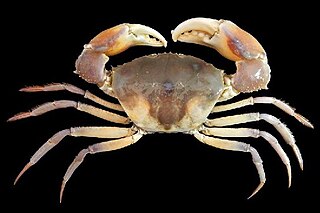
Galenidae is a family of crabs, one of three in the superfamily Pilumnoidea. It contains four genera, three of which are monotypic. At present five species have been described in this family.

Eucrate is a genus of crabs of the family Euryplacidae containing the following species:

Leptomithrax is a genus of crabs in the family Majidae, first described by Edward J. Miers in 1876. They have been on Earth for 37.2 million years.
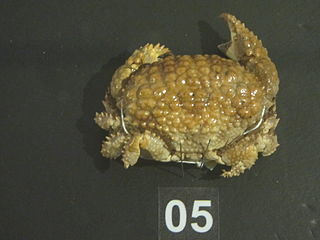
Daira is a genus of crabs and is the only genus in the family Dairidae.

Macrophthalmus japonicus, the Japanese mud crab, is a species of sentinel crab in the family Macrophthalmidae found in Asia. The taxon was described by Wilhem de Haan in 1835.

Ocypode kuhlii, the Kuhl's ghost crab, is a species of crab from the Ocypode genus. It is a mid to large-sized species of Ocypodidae. The species was described in 1835 by De Haan.



















